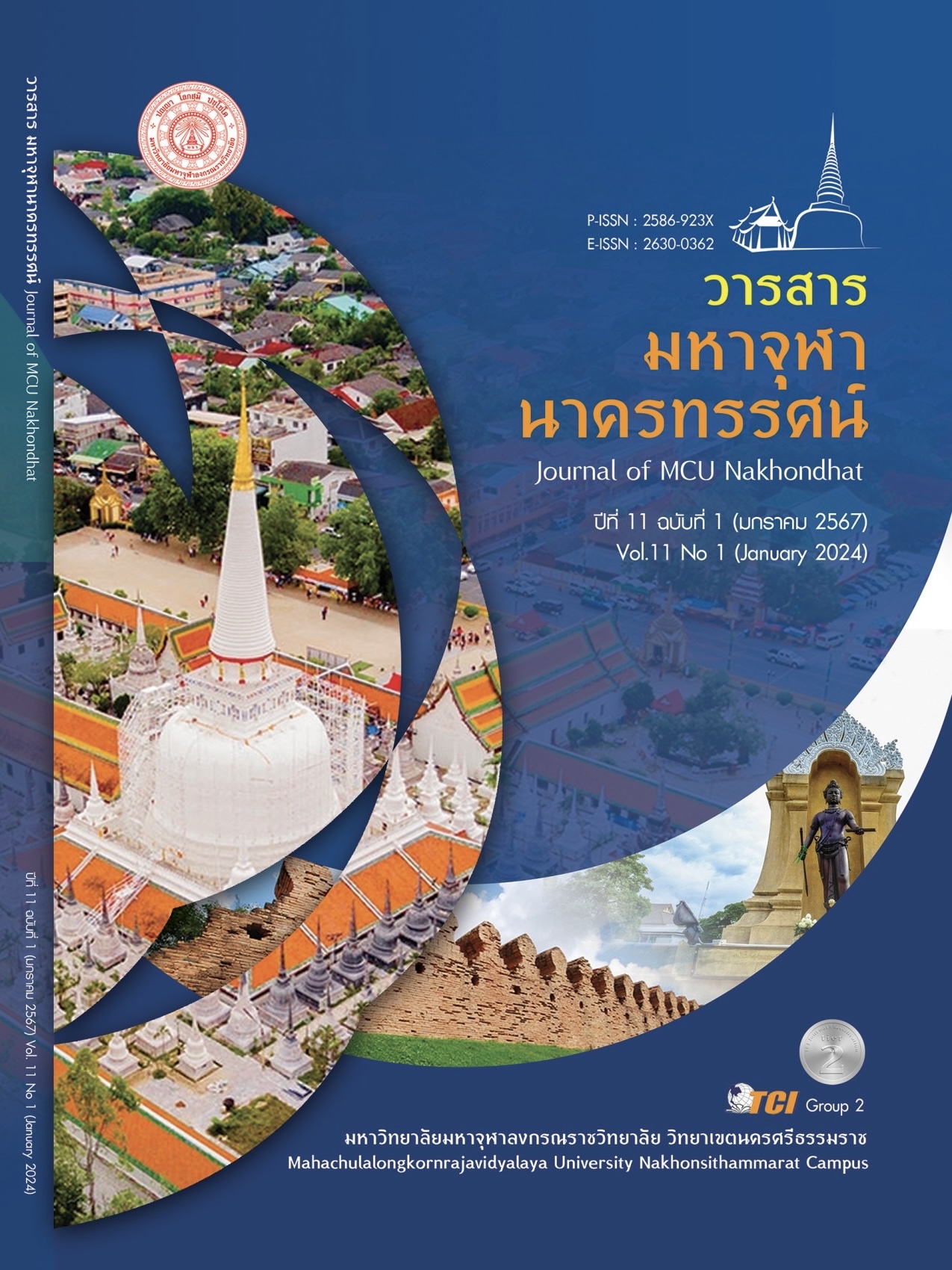A META - SYNTHESIS PF RESEARCH ON EDUCATIONAL MANAGEMENT IN HISTORICAL MUSEUMS IN THAILAND
Main Article Content
Abstract
The objectives of this research were 1) to analyze the characteristics of the educational management of historical museums in Thailand, 2) to study the important factors related to the educational management of historical museums in Thailand, and 3) to synthesize the knowledge of the educational management of historical museums in Thailand. It is a qualitative me - ta synthetic research. The study population was 159 research on museums in Thailand from the research database (ThaiLis) from 1992 to 2020. The research sample is research that has 8 contents regarding educational management of historical museums in Thailand. The tool is a 3 -part synthesis summary form: basic information, content, and research results. Collect documentary data. The results of the research were as follows: 1) Characteristics related to the educational management of historical museums in Thailand. Overall, the focus is on the most permanent exhibition management aspect. On a case – by - case basis, it was found that rotating exhibitions, outdoor exhibitions, mobile exhibitions, special exhibitions, and others have been given priority to the management of permanent exhibitions, 2) Important factors related to the educational management of historical museums in Thailand It was found that there are 6 important factors: 2.1) participatory management, 2.2) private administration, 2.3) living museum or learning museum, 2.4) marketing and public relations management, 2.5) museum management through the use of technology, 2.6) museum management by providing services. and 3) knowledge of educational management of historical museums in Thailand. It was found that historical museums can be divided into 2 types of administration: government museums/temples, and private museums.
Article Details

This work is licensed under a Creative Commons Attribution-NonCommercial-NoDerivatives 4.0 International License.
References
กิตพล เชิดชูกิจกุล และสุรศักดิ์ จิรวัสตร์มงคล. (2560). รูปแบบการจัดการสื่อสารพิพิธภัณฑ์อุทยานการเรียนรู้กรุงเทพมหานครที่มีผลต่อความสำเร็จของการท่องเที่ยวเชิงสร้างสรรค์. วารสารกระแสวัฒนธรรม, 18(33), 30-42.
กุณฑิกา ชาพิมล และดีอนา คาซา. (2565). พลวัตของพิพิธภัณฑ์ไทย: ความหมายใหม่ในสถานที่เดิม. วารสารศิลปศาสตร์ มหาวิทยาลัยธรรมศาสตร์, 22(3), 355- 370.
จิตตรา มาคะผล. (2555). การพัฒนาพิพิธภัณฑ์ท้องถิ่นเพื่อส่งเสริมการศึกษาเชิงสร้างสรรค์จิปาถะภัณฑ์สถานบ้านคูบัว จังหวัดราชบุรี. วารสารศิลปากรศึกษาศาสตร์วิจัย, 4(2), 114-129.
ญาณินทร์ รักวงศ์วาน. (2554). พิพิธภัณฑ์ท้องถิ่นกับการสงวนรักษามรดกทางวัฒนธรรมของชุมชนท้องถิ่น. วารสารดำรงวิชาการ, 10(1), 1-24.
ฐิติพร มีศีล. (2559). พิพิธภัณฑ์กับคุณค่าด้านการศึกษาจากประสบการณ์. ใน วิทยานิพนธ์ สาขาวิชาการจัดการมรดกทางสถาปัตยกรรมและการท่องเที่ยว. มหาวิทยาลัยศิลปากร.
บุญชู บุญลิขิตศิริ. (2557). การออกแบบเทคโนโลยีการเรียนรู้สำหรับพิพิธภัณฑ์ THE DESIGNING OF LEARNING TECHNOLOGY FOR MUSEUMS. วารสารครุศาสตร์, 44(3), 302-314.
บุหลัน กุลวิจิตร. (2562). การจัดนิทรรศการในยุคดิจิทัลของพิพิธภัณฑ์. วารสารอักษรศาสตร์ มหาวิทยาลัยศิลปากร, 41(2), 303-317.
พระราชบัญญัติการศึกษาแห่งชาติ (ฉบับที่ 2). (2545). ราชกิจจานุเบกษา. เล่ม 119 ตอนที่ 123 ก. หน้า 16-21. (19 ธันวาคม 2545).
พิชญ์ พงษ์สวัสดิ์. (2565). พิพิธภัณฑ์/เมือง. เรียกใช้เมื่อ 5 พฤษภาคม 2566 จาก https://www.matichon. co.th/article/news_3569212
ศูนย์มานุษยวิทยา. (2566). ประเภทพิพิธภัณฑ์ตามการจัดแสดง. เรียกใช้เมื่อ 5 พฤษภาคม 2566 จาก https://db.sac.or.th/museum/
สาทิสลักษณ์ ชาติเสริมศักดิ์ และคณิต เขียววิชัย. (2560). การศึกษาบทบาทพิพิธภัณฑ์พื้นบ้านวัดม่วงเพื่อเป็นแหล่งเรียนรู้ของชุมชน A Study of Roles of Wat Muang Folk Museum As a Community’s Learning Centers. วารสารศิลปากรศึกษาศาสตร์วิจัย, 9(2), 231-242.
ICOM. (2010). Running a Museum: Practical Handbook. Paris: ICOM.


